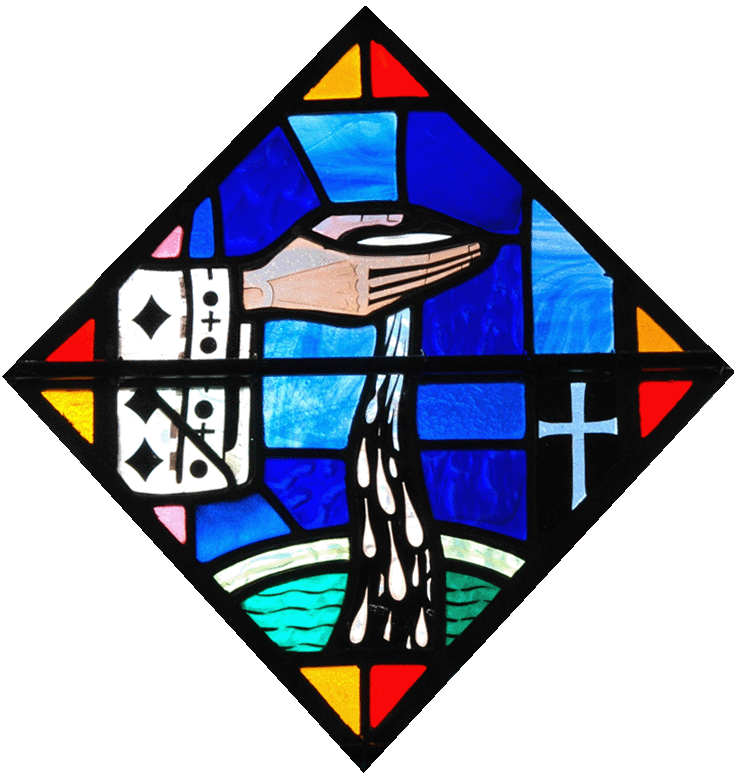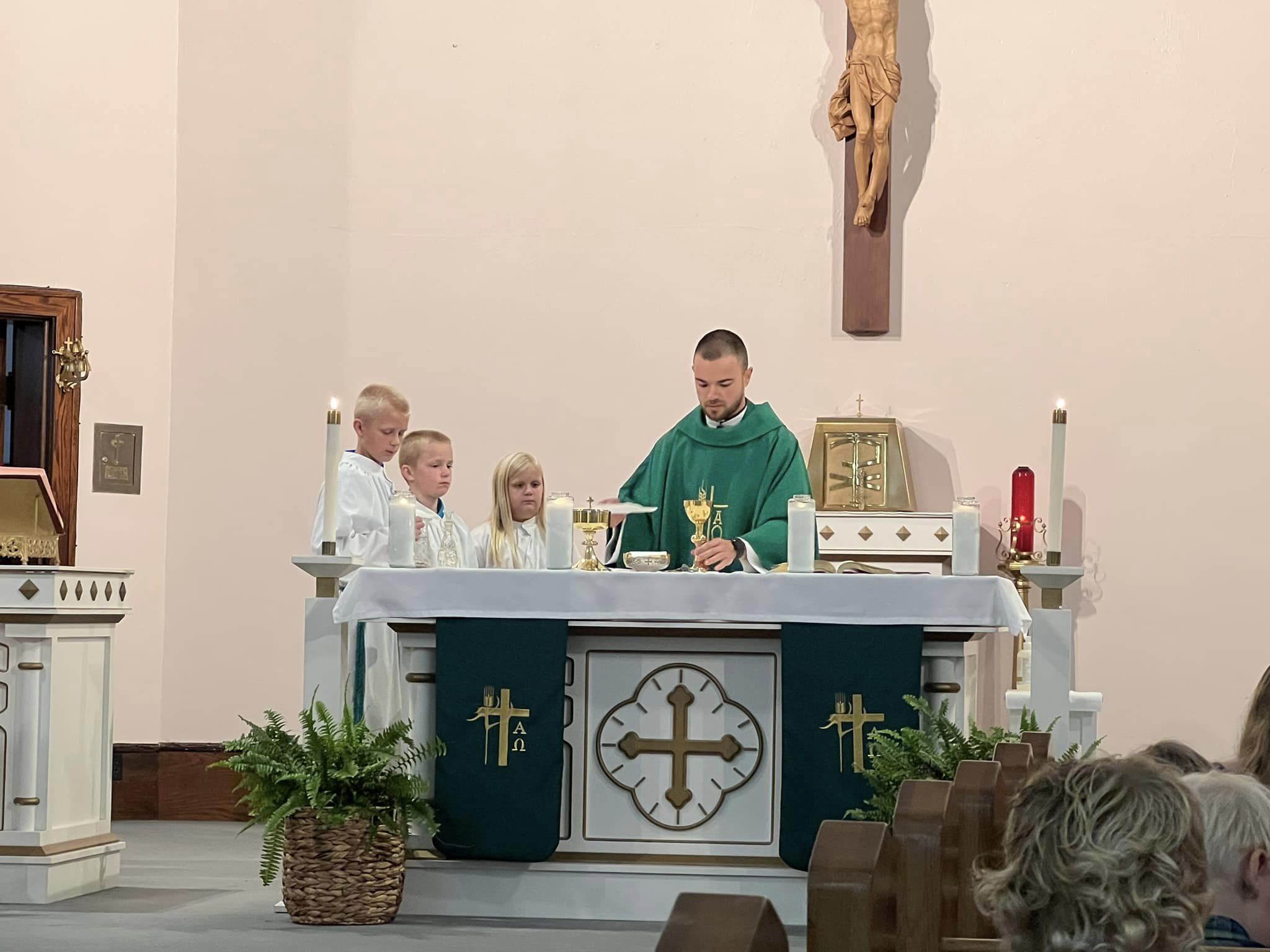CELEBRATING THE SACRAMENTS
Sacrament of Baptism:
"Do you not know that all of us who have been baptized into Christ Jesus were baptized into his death? We were buried therefore with him by baptism into death, so that as Christ was raised from the dead by the glory of the Father, we too might walk in newness of life." (Rom 6:3-4)

Here at Holy Name of Mary Parish, Baptism Is usually celebrated during the weekend Mass as requested by the family. Parents of infants to be baptized must be practicing Catholics and at least one parent must be a registered parishioner (regular weekend Mass attendance).
Contact the office to schedule Pre-baptism classes.
Baptism is a bath of water in which the "imperishable seed" of the Word of God produces its life-giving effect. St. Augustine says of Baptism: "The word is brought to the material element, and it becomes a sacrament."
Baptism is a Sacrament of Faith and must be nourished after Baptism. For the grace of Baptism to unfold, the parents' help is important. So too is the role of the godfather and godmother, who must be firm believers and ready to help the newly baptized throughout their Christian life. CCC1255
Sacrament of Penance and Reconciliation:
Saturdays at 3:30 pm at OLLH; Sundays at 10:15 am at St. Anthony, except on First Saturdays which is at 8:30 am, or by appointment.
The Catechism of the Catholic Church teaches us this about the Sacrament of Penance:
"This Sacrament is called the sacrament of conversion because it makes sacramentally present Jesus' call to conversion, the first step in returning to the Father5 from whom one has strayed by sin.
It is called the sacrament of Penance, since it consecrates the Christian sinner's personal and ecclesial steps of conversion, penance, and satisfaction.
It is called the sacrament of confession, since the disclosure or confession of sins to a priest is an essential element of this sacrament. In a profound sense it is also a "confession" - acknowledgment and praise - of the holiness of God and of his mercy toward sinful man.
It is called the sacrament of forgiveness, since by the priest's sacramental absolution God grants the penitent "pardon and peace."
It is called the sacrament of Reconciliation, because it imparts to the sinner the live of God who reconciles: "Be reconciled to God."7 He who lives by God's merciful love is ready to respond to the Lord's call: "Go; first be reconciled to your brother." (CCC 1423-1424)
Sacrament of Matrimony:
Catholics intending to celebrate the sacrament of Matrimony must notify the parish at least 6 months before the proposed wedding date. They are to register for premarital catechesis or course. At least one party must be a registered parishioner (regular weekend Mass attendance).
What is the Covenant of Matrimony?
"The matrimonial covenant, by which a man and a woman establish between themselves a partnership of the whole of life, is by its nature ordered toward the good of the spouses and the procreation and education of offspring; this covenant between baptized persons has been raised by Christ the Lord to the dignity of a sacrament." (CCC 1601)
In the Latin Rite the celebration of marriage between two Catholic faithful normally takes place during Holy Mass, because of the connection of all the sacraments with the Paschal mystery of Christ.120 In the Eucharist the memorial of the New Covenant is realized, the New Covenant in which Christ has united himself for ever to the Church, his beloved bride for whom he gave himself up.121 It is therefore fitting that the spouses should seal their consent to give themselves to each other through the offering of their own lives by uniting it to the offering of Christ for his Church made present in the Eucharistic sacrifice, and by receiving the Eucharist so that, communicating in the same Body and the same Blood of Christ, they may form but "one body" in Christ. CCC 1601)
Sacrament of Anointing and Care of the Sick:
Please do not hesitate to call the office whenever a family member needs anointing, last rites or a visit from the priest, whether at home or at the hospital.
"In the Church's Sacrament of Anointing of the Sick, throughthe ministry of the priest, it is Jesus who touches the sick to heal them from sin – and sometimes even from physical ailment. His cures were signs of the arrival of the Kingdom of God. The core message of his healing tells us of his plan to conquer sin and death by his dying and rising.
The Rite of Anointing tells us there is no need to wait until a person is at the point of death to receive the Sacrament. A careful judgment about the serious nature of the illness is sufficient.
When the Sacrament of Anointing of the Sick is given, the hoped-for effect is that, if it be God's will, the person be physically healed of illness. But even if there is no physical healing, the primary effect of the Sacrament is a spiritual healing by which the sick person receives the Holy Spirit's gift of peace and courage to deal with the difficulties that accompany serious illness or the frailty of old age." (USCCB Catechism for Adults)
Sacrament of the Holy Eucharist
Please see the Faith Formation page for more information. If you have a child who is 7 years or older and does not attend Our Lady of Lake Huron Catholic School, please call the Faith Formation Coordinators for more information on scheduled Classes for First Holy Communion.
"The Sacrament of Holy Eucharist is the source and summitt of our Christian life. This sacrament completes Christian initiation. The other sacraments are bound up with the Eucharist and are oriented toward it. For in the blessed Eucharist is contained the whole spiritual good of the Church, namely Christ himself, our Pasch. The Eucharist is the efficacious sign and sublime cause of that communion in the divine life and that unity of the People of God by which the Church is kept in being. It is the culmination both of God's action sanctifying the world in Christ and of the worship men offer to Christ and through him to the Father in the Holy Spirit." (CCC 1322 - 1325)
 Holy Name of Mary Catholic Parish
Holy Name of Mary Catholic Parish